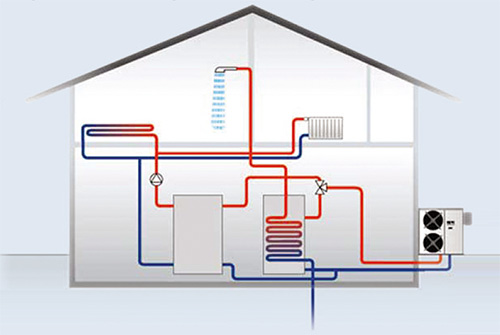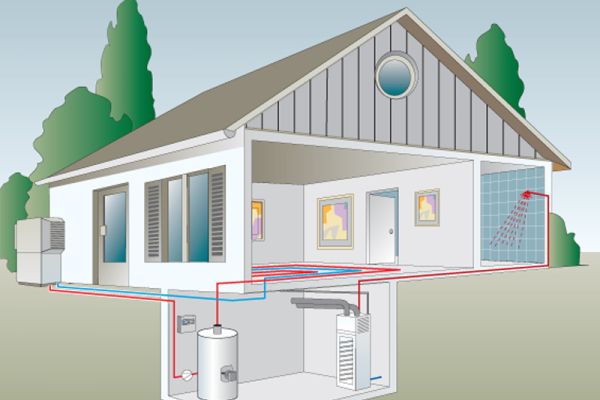Heat Pumps: How do they work and why should I choose them?
Creta Energon, having many years of experience in the study and installation of heat pumps for cooling, heating and domestic hot water production, depending on the needs of your space, presents the reasons for the immediate installation of a heat pump in order to save energy and money.
What is a heat pump and how does it work?
The heat pump is an electrical device that removes heat from a space or environment and transfers it to another. That is, it alternates the cooling cycle of the system, resulting in hot or cold air depending on the needs of the room.
In particular, the heat pump is an energy-efficient system that absorbs heat from the ambient air for heating and hot water. It transfers the heat of the ambient air into the house through a water hydraulic system, such as underfloor heating, fan coils, and radiator bodies.

Basic categories of heat pumps
1. Monoblock or compact heat pumps.
The specific machine consists of an external unit that includes the hydraulic system and is intended for installation in a specific outdoor space so that energy from the immediate environment is used.
2. Split type heat pumps.
In this type of heat pump, the outdoor unit is the cooling unit which is also the one that absorbs energy from the environment, while the indoor unit is the hydraulic unit where it is also the part that will be connected to the hydraulic heating pipes.
What will I do with my existing heating system?
In domestic or commercial premises that already have a gas or oil boiler installed, heat pumps can be combined with the existing system with a large reduction in running costs by completely eliminating the existing system.
The advantages of heat pumps
The biggest advantage of the heat pump compared to all other heating devices is the very low consumption during its operation. In addition to great economy, heat pumps offer a number of other advantages, such as:
- No boiler room space is required
- They require minimal maintenance
- They are the most environmentally friendly heating devices
- They adjust their power according to the conditions and needs of the space.
- They have many built-in functions
Applications of heat pumps
Space heating
During their winter operation, heat pumps draw energy from the cold environment and transfer it to our warmer space, maintaining or increasing the temperature inside the house
Space cooling
During summer operation, heat pumps draw energy from inside our space and transfer it to the warmer environment, keeping our home cool. A necessary condition for the possibility of cooling is that the pump is connected either to an underfloor system (underfloor cooling) or to element fan units (fan coils). Cooling mode is not possible with conventional radiators.
Hot water heating
The connection of a heat pump with a hot water boiler makes it possible to heat hot water using the heat pump. This connection can be made either in combination with a heating system (so the heat pump works to heat both our space and the water) or exclusively for heating hot water. This application of heat pumps is of great interest especially in hotel units, and provides a solution to a major problem of hotels, namely the high cost of hot water production.
Special conditions for choosing a heat pump
The coefficient of performance (Coefficient of Performance - COP) of the pump is the measurement that proves to us how efficient our pump is in relation to the amount of energy it consumes. More specifically, it is defined by dividing the amount of energy it delivers by the amount of electricity needed to operate the pump at a certain temperature. The higher the efficiency, the more efficient our pump is. COP= (ENERGY OUT / ENERGY IN ) x 100%
The energy efficiency ratio (Energy Efficiency Rating - EER) of the pump is the measurement that proves to us whether our pump is efficient in cooling. Specifically, it is defined by dividing the cooling capacity of the pump in Btu/h by the electrical energy input in watts at a certain temperature. The higher the efficiency rating, the more efficient our pump is. EER= (OUTPUT COOLING ENERGY IN BTU / INPUT ELECTRICAL ENERGY IN WATT) x 100%.
In conclusion, Heat Pumps can be installed in new or existing buildings and can be connected to existing radiators, underfloor heating and cooling systems as well as Fan Coils for heating and cooling. They can also be combined with the already existing boiler room, or with other renewable sources, such as for example solar systems for heating support.
We are at your disposal to recommend the appropriate system for your space.

















